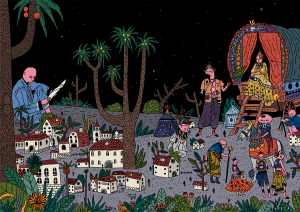
Cien Años de Soledad or One Hundred Years of Solitude by Gabriel Garcia Marquez blends the fantastical with realism to tell the story of one family’s misery. After Macando is founded by José Arcadio Buendía and Úrsula Iguarán it spans over seven generations of Buendías before the town is destroyed and scoured from the earth. The novel can be overwhelming at times with how much is happening, with many family members using the same names.
One of the overarching themes of the novel’s plot is how inescapable the fates of the Buendías. Part of this inescapable fate seems to be self-inflicted by the family’s actions. They never learn from the mistakes and deaths of their predecessors, seeing them as already set in stone. And with this belief, they make no attempts to change themselves. The reader can see this through their continued choice to interbreed with each other. Many of the family actively or accidentally pursue incestuous relationships with each other. The family already started with a limited gene pool from José Arcadio Buendía and Úrsula Iguarán (who were first cousins) and this was something that causes Úrsula great anxiety about their descendants. She feared one day a child would be born with a tail as punishment for their sins of incest. And still from her to seven generations later when this fear comes true, the family still chooses incest multiple times. This ties back to their belief that everything is already set in stone for them so why should they change. They are already doomed so why shouldn’t they indulge in more sin? Their “doom” can almost be viewed as a genetic trait that both José Arcadio Buendía and Úrsula Iguarán had and passed it to their children. Instead of it being bred out through new blood entering their family, it is becoming one of the most prominent genes due to their incest. Their choices are furthering their misery.
This partially self-fulfilling fate is isolation. Very few of the Buendías family have left Macondo, and even when they do they eventually return to the town and family. Even when Macondo is becoming more and more deserted and the family home is falling apart, they still do not leave. The family is also haunted by the ghosts of deceased family members, blending past and present. These hauntings also show that even in death the family is stuck in the town due to their choices. The family’s belief in being trapped to their fate can be perfectly summed up by the final novel’s last line “because races condemned to one hundred years of solitude did not have a second opportunity on earth.” (383). The Buendía family is both self-obsessed and self-loathing at the same time and their inability to change is what dooms them.
I like that you pointed out that the family does not correct their mistakes, and does so because they feel that everything is set in stone. This is reflected in the repetition of names throughout the novel. These characters seem to make the same mistakes as their ancestors of the same name, which is interesting.